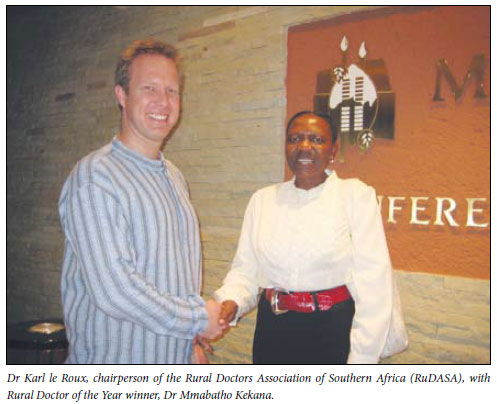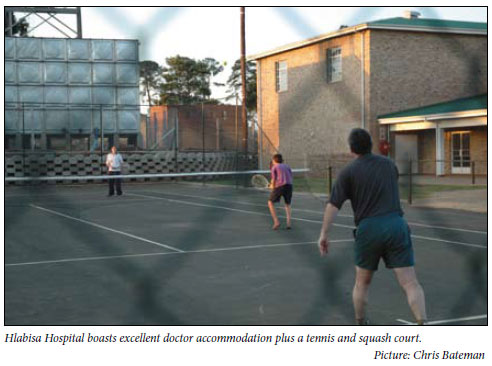Services on Demand
Article
Indicators
Related links
-
 Cited by Google
Cited by Google -
 Similars in Google
Similars in Google
Share
SAMJ: South African Medical Journal
On-line version ISSN 2078-5135
Print version ISSN 0256-9574
SAMJ, S. Afr. med. j. vol.100 n.11 Pretoria Nov. 2010
IZINDABA
The most accurate spear at Hlabisa - a Goko doctor

Every public hospital, especially a rural one, needs a skonkwane or anchor person who shoulders responsibility, leads by example, initiates or maintains efficient systems and motivates staff. Yet few have one, let alone one who is black, female and a role model.
So when Dr Mmabatho Kekana, 52 years old, the medical manager at Hlabisa Hospital in the remote Umkhanyakude District in the far northern KwaZulu-Natal coastal region, was nominated by her peers for Rural Doctor of the Year, she was the sure-fire favourite. Confirming her victory, the Rural Doctors Association of Southern Africa (RuDASA) selection committee member, Dr Alma de Vries, said 'she showed us what can be done to turn a hospital around. She's an example of what our health minister, Dr Aaron Motsoaledi, so often speaks of - good hospital management. Doctors get disgruntled very quickly when management is poor,' she added.
Former Mosvold Hospital veteran and now district family physician for the five hospitals in Umkhanyakude, Dr Harvey Williams, said Hlabisa 'haemorrhaged' doctors after 2003 when regulations governing the local registration of British doctors were changed. What appeared to be the last outpost of the British Empire suddenly lost three-quarters of its doctors and service delivery was decimated - a sad day in the former colony. Williams said the hospital, which serves 250 000 country dwellers who use whatever transport is available, often traversing rough terrain over long distances, was soon in 'serious trouble', with just one resident Cuban doctor and three or four community service doctors working impossible hours for several years.
Then it was identified as a presidential development site and upgraded, and top-grade flats were built to convince professional staff, already tempted by ground-breaking HIV and other work conducted at the nearby Africa Centre for Health and Population Studies, to stay.
Added to this in 2005 was a virtually unheard of phenomenon - a dedicated 52-year-old local black woman doctor, fresh out of five years of private practice in her home town of Thembisa. Her initial handson public practice was at Thembisa Hospital. A single mother of one and grandmother to three, she stumbled into private practice 'by accident'. A colleague fell pregnant and asked her to fill in as a locum - and then promptly fell pregnant again. By the time she got to KwaZulu-Natal, Kekana had just begun grappling with an MBA, was passionate about ubuntu and determined to harness all Hlabisa had going for it. She's helped turn the dire staffing shortage around. Hlabisa today has 12 full-time and six sessional doctors, the latter helping out at weekends. The hospital has a patient drainage twice that of its nearest district rival and delivers well over 300 babies each month.
Black women doctors avoid public sector
De Vries says her own qualitative research indicates that few black female doctors end up in the rural public sector, most feeling obliged by their families to 'go private and make money'. Citing other research on women in medicine (by Professor Joss Kane-Berman), she said women also 'tend to be more natural communicators'. 'Mmabatho is a wonderful role model of somebody who's worked in the city and went back rural, deciding that the public sector is where her passion lies,' she added.
Kekana unwittingly illustrated her ability to communicate (and thus motivate her staff) by telling Izindaba how, during the soccer World Cup in mid-July, she was on leave at home in Thembisa preparing for her MBA exams. 'I was sitting at home with my mother and thinking of all the good doctors I have, so I started sending them individual thank you SMS messages.' The catalyst was having just heard how one of her four 'comserves' and one of her three medical officers had just diagnosed two ectopic pregnancies, successfully saving the mothers. 'We have an amazing Swiss chief medical officer, Joerg Michelle, who tutors and instils such confidence in his juniors that they perform incredibly well. His surgical skills outperform any equipment we have, but we're very glad to have him,' she says, neatly shifting the limelight.
Doing ordinary things very well
Kekana has honed up on all that is good. For example, she's kept the daily 08h00 clinical staff meeting, piloted by a British former (female) colleague, during which they share patient complications and status reports and midwives give a brief report on their charges. On Mondays 'this goes on a bit' (often because weekend sessional doctors 'haven't followed local protocols'), and sometimes discussion evolves into invaluable case reports.
The Africa Centre's world-class HIV/ AIDS research and treatment initiatives have helped all five hospitals in the wider district reduce mother-to-child HIV transmission by an average of 75% (92% at Hlabisa), spearheaded a successful circumcision drive and created highly effective databases for TB and HIV patient tracking, enabling clinicians to immediately find 'holes in the data'. 'We have TB/HIV tracing teams that go out twice a week to find people who were due to come in but didn't. Pregnant HIV and/or TB mothers are not falling through the cracks anymore,' Kekana says with a satisfaction only somebody who truly cares about her patients can display. Hlabisa services 17 clinics, the largest at KwaMsane on the road to Empangeni, where Kekana visits weekly and which provides her with one of her favourite anecdotes. A couple fished out a referral letter from the local Ngwelezane Hospital asking Kekana to write the husband a medical certificate for the previous two days because he wanted to return to work the following day. 'The wife says to me, "don't you remember my husband? He was almost dead from meningitis and you saved him at your hospital in 2008. I heard you were at KwaMsane today so I had to come - if it wasn't for you I wouldn't have a husband today".'

Kekane said only then did she 'click'. The man had come into outpatients barely conscious and had subsequently spent two weeks unconscious before a lumbar puncture indicated the diagnosis. Only two months later was he back on his feet. 'It was quite satisfying to come across them two years later, so full of gratitude,' Kekana chuckles.
First woman winner in eight years
Dr Jenny Nash, one of the RuDASA public sector rural veterans (now stationed in East London), who helped judge the rural doctor competition, said it was 'a delight to find someone of her calibre doing the work she's doing in a rural area. She's a very hands-on, humble person who gets involved and helps out, very genuine.'
The award is named after Dr Pierre Jaques, a founder member of RuDASA and a doyen of rural practice in South Africa. He spent most of his working life at Elim Hospital in rural Limpopo province and has been a tireless advocate for rural health and the role of the rural doctor in South Africa. It is the first time in the eight years of the award's existence that it has been won by a woman.
Chris Bateman














